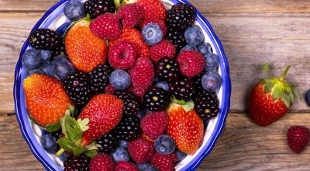
Some of the most common diseases affecting the male reproductive system are prostate adenoma and prostatitis. The second is an inflammatory process that occurs in the tissues of the prostate gland, namely, the first is a tumor that forms in this organ.
These are problems that are actively diagnosed in men. But everyone knows that the right food can protect against many diseases as well as become one of the ingredients of the treatment process. Thus, an important role in the treatment of this disease plays diet for prostatitis and prostate adenoma. With its help, the healing process is more active and requires less time.
The essence of such a diet
No one can argue that food is healing and crippling. For this reason, when pathological changes are detected in the patient's body, the physician most often prescribes restrictions on a number of foods consumed. A similar diet has been developed to help the male body fight disease affecting the prostate gland.
Selected for each patient individually, taking into account the severity of the pathology, its general condition and anamnesis, as well as taste preferences. At the same time, it has been practically proven that it will not be possible to recover without changing the diet and nutritional balance.
Food at least should not worsen the health condition, at best - become one of the elements of the treatment process. Therefore, the essence of the diet for prostatitis and prostate adenoma is reduced to alleviate the patient's condition.
If a person wants to recover, he must act in accordance with the restrictions. "The right" foods slow down the development of pathology and increase the chances of faster recovery.
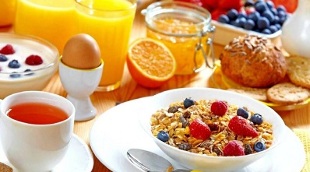
Special attention is paid to products that contain a high percentage of selenium (Se) and zinc (Zn), which have a beneficial effect on the tumor, reducing its size. During treatment, the patient should take 25 mg of zinc during the day as well as at least 5 μg of selenium.
Products have a large amount of zinc:
- Seafood: seafood, mussels, shrimp.
- Red meat, mostly lamb and lean beef.
- Wheat and bran cabbage.
- Buckwheat.
- Watermelon and pumpkin seeds
- Chocolate and cocoa powder.
- Beef liver.
- sesame.
- Peas.
- Egg yolks.
- Mushrooms.
The second important element, selenium, is found in the following foods:
- Pork and beef liver.
- Rice, barley, buckwheat and oatmeal.
- Octopus meat.
- Veza.
- Beans and lentils. Sea kale.
- Pistachios.
- Peas.
- Scallops and shrimp.
- Olive oil.
Also, do not forget about vitamin E, which increases the effective absorption of selenium. It should be borne in mind that from food the body absorbs only a part (at best - half) of trace elements in its composition.
As the study showed, the main cause (catalyst) of adenoma manifestation is hormonal imbalance, which has worsened over the years. With age, the amount of testosterone decreases, and at the same time the estradiol concentration increases. Also, an increase in the amount of adipose tissue affects the appearance and growth of a tumor. It follows that one of the ways to prevent adenoma should be weight control.
In addition, it is necessary to constantly take care of bowel cleansing. Therefore, diet should be associated with solving this problem. But before you start sticking to it, you need to study the list of foods you can and cannot eat.
What else is important?
Drinking fluids with meals and just before bed is discouraged. Otherwise, the digestive process deteriorates, and at the same time the overnight load on the excretory system increases. Water and beverages should be consumed between meals or one hour after meals.
it is also necessary to maintain a balanced diet for adenoma and prostate and a variety of foods. Protein eating should predominate. The fat content is allowed, but not more than 30%. Basically, these should be vegetable fats.
Do not overeat at night. It is necessary to monitor your weight, avoid overeating and the appearance of excess pounds.
Reasons that stimulate problem development
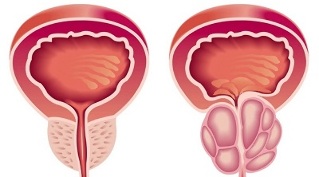
The main reasons are hormonal changes and infections. Consumed food can also contribute to the development of such a pathology.
If the disease has progressed to a chronic stage, then you will need to constantly adhere to these recommendations, because if the regimen is violated, a worsening can be provoked. The main principle of the diet for chronic prostatitis and prostate adenoma is that food should be light, digestible quickly. The rest of the principles of this diet as well as the list of "beneficial" and "harmful" products are shown above.
After surgery to remove the adenoma
With a certain clinical picture, doctors can raise the issue of adenoma removal. After surgery, the patient undergoes rehabilitation, part of which is diet after prostate adenoma surgery.
Its main principle is the predominance of vegetables, protein foods and fruits, the reduction of fat, especially of animals. Vegetable fats should be preferred, which provide the body with the substances necessary for normal functioning.
A high level of plant protein in food has a beneficial effect on the body, and this seriously reduces the risk of developing cancer.
The largest (or completely excluded) restriction affects products such as:
- Thick fibers.
- Food containing dyes, food additives, preservatives and flavorings.
- High-calorie foods with a high percentage of animal fat.
- Fried, spicy and very spicy foods.
- Smoked meat and pickles.
- Carbonated and caffeinated beverages. Alcohol.
The central part of the diet for prostate adenoma in men should be vegetables and fruits packed with vitamins, fiber, trace elements that activate the digestive process and prevent stagnation in the pelvic organs.
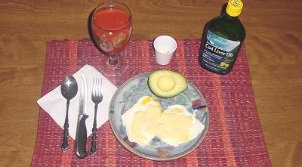
As mentioned above, do not ignore the level of bowel function. In addition to eliminating foods that provoke gas, and that can "regulate bowel movements, " you should also review your diet: it should be taken in small portions, but the number of meals should be increased. This will keep your digestive tract toned, stimulating more active production of gastric juice, which can serve to prevent constipation.
In the postoperative period, prunes, boiled beets, fermented dairy products, dried apricots, carrots, cereals and other dishes that have a mild laxative effect appear on the patient's table.
The diet after BPH should be as follows. To shorten the postoperative recovery period, it is necessary to reduce the load on the digestive and genitourinary system. A balanced diet boosts the body's immune status, allowing it to fight disease more effectively and activate hidden reserves for faster healing.
Diet menu for prostatitis and adenoma
Must comply with the product instructions above. When the disease worsens, you should switch to eating in small portions. The daily diet should be divided into four to six meals. The diet menu for prostate in men should consist of simple and healthy dishes.
Below is a daily meal plan. So a diet for prostate for a week can consist of the following menu.
First day
Breakfast:
- Bollgur.
- I am a fruit.
- Decaffeinated tea.
Snack: Bananas (average).
Lunch:
- Lean vegetable soup.
- mashed potatoes.
- Chicken breast in sweet and sour sauce.
- Compote with dried fruits.
Snack: Jelly Raspberry.
Darka:
- Squid and zier.
- boiled cabbage.
Before bed - yogurt.
The second day
Breakfast:
- Curd mass.
- Jelly with fruits and berries.
- Snack: A handful of nuts.
Darka:
- Soup cooked in light vegetable juice.
- Boiled fish.
- Salad - any choice of vegetables (fresh).
- Green tea.
Snack: baked apples with cinnamon and honey.
Darka:
- Rabbit baked in sour cream.
- Carrot salad with beets.
Before bed: milk (glass).
Third Day
Breakfast:
- Qull elbi.
- Raw carrot salad.
- Fruit juice.
Snack: Roasted pumpkin with apples.
Lunch:
- Fresh salad with herbs and vegetables.
- Fiston.
- Boiled asparagus.
- Non-carbonated mineral water (glass).
Afternoon snack: fruit salad.
Darka:
- Cook the fish.
- Baked potatoes.
- Fresh cucumber.
Bedtime: natural yogurt.
The Fourth Day
Breakfast:
- A boiled egg.
- Buckwheat porridge.
- Berry jelly.
Snack: apples.
Lunch:
- Veshi.
- Boil chicken.
- Cabbage cutlet.
- Herbal tea.
Snack: fresh apples.
Darka:
- Roasted chicken in orange sauce.
- Salad with fresh vegetables.
Before bed: fermented baked milk (glass).
Day Five
Breakfast:
- Boiled rice.
- Soft boiled egg.
- Fresh fruits.
Snack: banana dessert.
Lunch:
- Vegetarian bursa.
- Baked fish on a vegetable pad.
- Green salad.
- Compote with dried fruits.
Afternoon snack: fruit syrup.
Darka:
- Squid stuffed with rice.
- Any vegetable salad.
Before bed: kefir (glass).
Sixth day
Breakfast:
- Corn porridge.
- A piece of hard (not thick) cheese.
- Herbal tea.
Snack: pear dessert.
Lunch:
- Spaghetti or any cooked al dente.
- Meat medallions on a vegetable pad.
- Fresh cherry tomatoes.
- Compote with fresh fruit.
Snack: cottage cheese with sour cream and raisins.
Darka:
- Pumpkin stuffed with vegetables and meat.
- Fresh cabbage salad.
Before bed: milk (glass).
Seventh Day
Breakfast:
- Pearl barley porridge with carrots and onions.
- Vegetable salad.
- Green tea.
Snack: A handful of nuts (whatever).
Lunch:
- Soup with mushroom puree.
- Toast for dark bread.
- Fresh juice.
Snack: Berry pie with me.
Darka:
- Fish baked in noodles.
- Vinaigrette.
- Fresh tomatoes.
Before bed: kefir (glass).
How to prepare meals for such a diet?
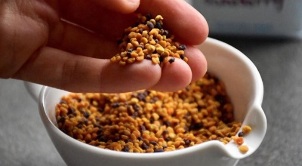
Below are some recipes for men with BPH diet.
As you can see, they are easy to make at home.
Stuffed bird fillet
To prepare this dish, you will need the following:
- Chicken or turkey, fillet - 500-750 grams.
- Rice - half a glass.
- Carrots - one (average size).
- Bulbs - 1-2 pieces.
- Garlic - 5-6 cloves.
- Tomato juice - 0, 5 liters.
- Allspice - pak.
- Salt of your choice (but remember that diet for prostate and BPH requires restriction of this product).
- Basil and other herbs (can be dried).
- Any vegetable oil.
Chicken fillet or turkey should be cut lengthwise. Depending on its thickness, you can get from two to three thin slices. If it cannot be cut thin, thick parts should be lightly beaten with a kitchen hammer or rod.
Peel the carrots and cut them into thin strips and onions into half rings. Peel a squash, grate it and squeeze the juice.Rice should be thoroughly washed with a few drops of water, boiled until softened, held lightly under the lid, then thrown into a colander and allowed to drain excess liquid. Then add onion, carrot, garlic, basil, pepper and salt to it. Mix everything well.
Put some minced rice sliced fillets in the middle and wrap them in envelopes. To ensure that they do not fall off during further processing, they should be secured with a toothpick or tied with a floss.
Pour some water into a large saucepan and bring to a boil. Add tomato juice, vegetable oil and onion. Fry the envelope fillets on all sides in a pan in a small amount of oil. The fire should become quite strong. The meat should have a crust that protects it from drying out and keeps it juicy. Do not overcook it: food for prostatitis and prostate adenoma should be light.
After frying, place the stuffed fillet in a pot of marinade and simmer until softened. Remove floss or toothpicks before serving.
Spotted roast with lemon and herbs
You need the following ingredients:
- Fillet per point - 400 grams.
- Crumbs of ground bread - a teaspoon.
- Dill - herd.
- Vegetable oil - three tablespoons.
- Salt of your choice.
Remove all bones from fish, rinse and dry with a kitchen towel. Prepare the marinade: mix the crackers, oil and salt. Add finely chopped dill. Rub the fish fillets with this mixture.
Transfer the fish to the oiled pan. In a preheated oven at 180 degrees, cook the fillets for about 15 minutes. Can be served at the table in lettuce leaves.
























